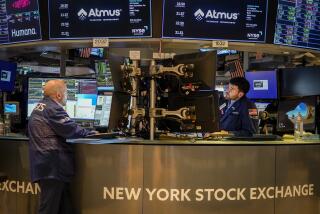Trade Deficit Soars on Asian Woes
- Share via
WASHINGTON — The shadow of Asia’s economic woes fell across U.S. trade prospects Thursday as the Commerce Department reported that the monthly deficit unexpectedly shot up to an eight-month high of $11.07 billion in September.
Clinton administration officials expressed concern that cheaper Asian currencies would aggravate trade imbalances by fostering more imports and making it harder for American companies to sell manufactured goods in the region.
“I can’t quantify exactly what percent, but it’s obviously having some impact,” Commerce Secretary Bill Daley told a news conference after the September figures were published.
“It is a concern as we go forward into next year,” Daley said.
Analysts said the United States was headed for record annual deficits, likely upward of $150 billion in 1998, a sharp spiral upward from the $111-billion shortfall posted for all of 1996.
The September gap with Asia’s newly industrialized countries--including Hong Kong, South Korea, Singapore and Taiwan--more than doubled to $2.02 billion from $956 million in August. That was the highest for any month in more than five years, since $2.1 billion in August 1992.
China was again the No. 1 trade dynamo, sending a flood of Christmas toys that pushed the bilateral deficit up 6.9% from August to a record $5.52 billion. The gap with Japan shot up 13.4% to $5.13 billion, right behind China.
The turmoil in Asian financial and currency markets was just setting in during September, triggered by a financial crisis in Thailand in July that swept through Southeast Asia, including Malaysia and Indonesia. Northeast Asia, notably South Korea, now is struggling to try to avoid having to seek an economic bailout under tough terms set by multilateral institutions.
Analysts said the worst lies ahead for the U.S. trade balance.
“September was a harbinger of higher trade deficits to come as a result of the Asian currency crisis,” said economist Sung Won Sohn of Norwest Corp. in Minneapolis.
“We will be getting a flood of imports from Asia, and we’ll have more trouble selling there because of the strong dollar and weakening economies out there,” Sohn said.
“I think we could easily approach a $150-billion trade deficit next year, he added, after an estimated shortfall of about $115 billion for all of 1997.
A vigorous U.S. economy offers struggling overseas trade partners a chance to try to fix their economic problems by selling more into the world’s largest consumer market, while at the same time buying fewer American manufactured goods.
Commerce Secretary Daley, citing Japan, spelled out the difficulty the Clinton administration faces in its bid to pry open protected overseas markets for more U.S. exports to foster domestic growth while they target American consumers.
“In Japan, we are faced with a weak yen, a stagnant Japanese economy and significant trade barriers,” he said. “All of these factors continue to contribute to our persistent trade deficit with that country.”
The topic is certain to arise when U.S. officials join Japan, China and other Asian nations that comprise 12 of the 18 countries meeting in Vancouver, British Columbia, on Monday and Tuesday at the fifth Asia-Pacific Economic Cooperation session.
President Clinton will attend the gathering, which likely will be dominated by discussion of how to keep the Asian region afloat whether or not that is on the formal agenda, and the rising U.S. trade gap has cast a shadow over the talks.
“This is one reason why in 1998 U.S. economic growth is likely to fall below 2%,” Norwest’s Sohn said, with a risk that Asian weakness could damage confidence enough to spread into other fast-emerging regions like Latin America.
Total U.S. imports rose 1.2% in September from August to a record $89.07 billion, while exports weakened by 0.7% to $78 billion.
Bond prices weakened slightly on the trade news but might have tumbled more except for a separate report from the Labor Department showing a surprising 20,000-person jump in new claims for jobless benefits last week to 333,000.
The jobless claims report indicated a potential easing in labor markets, where some employers were having trouble finding people to hire. The Federal Reserve Board, the nation’s central bank, had expressed concern that labor shortages could fuel wage demands and so add to inflationary pressures.
Prices for the bellwether 30-year Treasury bond fell $3.13 on a $1,000 bond, while the yield, which moves in the opposite direction, gained to 6.06% from Wednesday’s close of 6.04%.
On the New York Stock Exchange, the Dow Jones industrial average jumped 101.87 points to close at 7,826.61, boosted by the latest evidence of modest inflation pressures.
(BEGIN TEXT OF INFOBOX / INFOGRAPHIC)
Trade Gap
Soaring shipments from China and Japan dominated the U.S. trade imbalance in September as Asian economic turmoil helped drive the nation’s trade deficit to $11.07 billion. In billions of dollars:
Sept. 1997: $11.07
Source: Census Bureau
The Big Two
U.S. trade deficits with China and Japan hit record levels in September. In billions of dollars:
China
Sept. 1997: $5.5
Japan
Sept. 1997: $5.1
Source: Census Bureau
More to Read
Inside the business of entertainment
The Wide Shot brings you news, analysis and insights on everything from streaming wars to production — and what it all means for the future.
You may occasionally receive promotional content from the Los Angeles Times.










